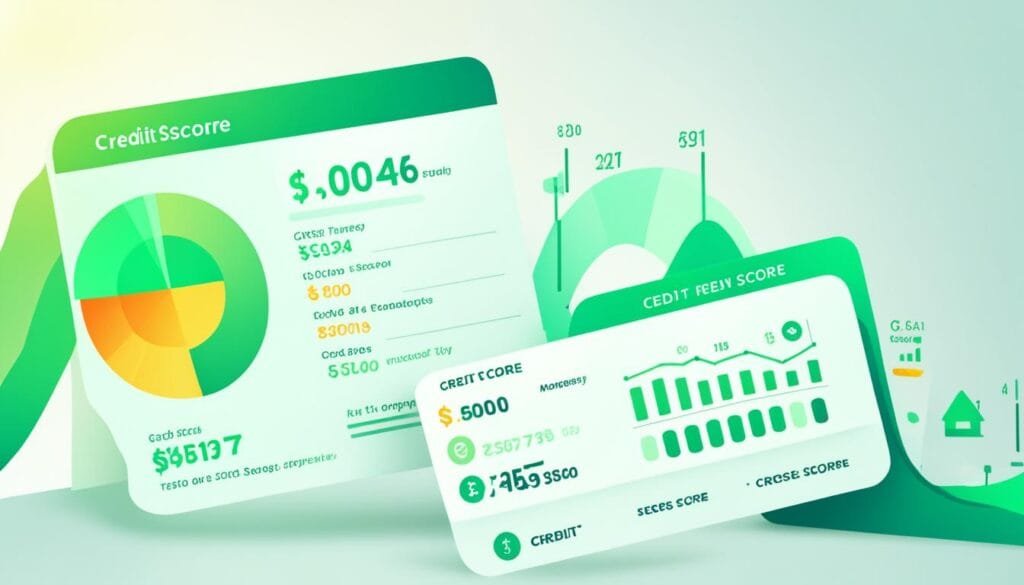Imagine this scenario: Sarah, a hardworking individual, had fallen behind on her credit card payments due to unexpected medical expenses. As a result, her credit score took a significant hit, making it difficult for her to secure favorable interest rates on loans or even rent an apartment. Desperate to improve her credit history and remove the negative items from her credit report, Sarah came across a strategy called pay for delete.
Pay for delete agreements, also known as pay for delete or pay-to-delete, promise a solution to individuals like Sarah who are eager to repair their credit. These agreements involve negotiating with creditors or debt collection agencies to remove negative information from the credit report in exchange for payment. Intrigued by the potential benefits, Sarah decided to delve deeper into the world of pay for delete agreements to understand how she could navigate them effectively and improve her financial standing.
Key Takeaways:
- Pay for delete agreements involve paying a creditor or debt collection agency to remove negative information from a credit report.
- It is important to understand the limitations and legal considerations associated with pay for delete agreements.
- Requesting pay for delete requires sending a formal letter to the creditor or collection agency stating the amount to be paid and the expected removal of negative information.
- While pay for delete is not expressly prohibited by the Fair Credit Reporting Act, accurate information cannot be forced off the credit report.
- Individuals have the option to navigate pay for delete themselves or seek assistance from credit repair firms to remove negative information and improve their credit history.
What Is Pay for Delete?
Pay for delete is an agreement between a debtor and a creditor or debt collection agency, where the debtor pays all or part of an outstanding balance in exchange for the removal of negative information from their credit report. This agreement typically involves the creditor contacting the credit bureau to remove derogatory comments or indications of late payment from the debtor’s account. It is important to note that only inaccurate or incomplete information can be forced off the credit report, while accurate information cannot be removed.
Pay for delete agreements provide an opportunity for individuals to take control of their credit history and actively work towards improving it. By negotiating with creditors or debt collection agencies, debtors can potentially have negative information removed from their credit reports, leading to an improvement in their credit scores and overall financial health.
How Does Pay for Delete Work?
- The debtor initiates the pay for delete process by contacting the creditor or debt collection agency.
- A negotiation takes place between the debtor and the creditor or collector to agree on a payment amount that, when received, will trigger the removal of negative information from the credit report.
- The debtor makes the agreed-upon payment to the creditor or collector.
- The creditor or collector then contacts the credit bureau to request the removal of the specified negative information.
- If the credit bureau verifies the request and determines that the information is inaccurate or incomplete, it will remove the negative information from the debtor’s credit report.
Note: It is crucial for debtors to retain all documentation related to the pay for delete agreement, including receipts or confirmation of payment, in case they need to dispute any discrepancies in the future.
Pros and Cons of Pay for Delete
| Pros | Cons |
|---|---|
| Opportunity to remove negative information from credit report | Success is not guaranteed – creditors or collectors may refuse the pay for delete agreement |
| Potential improvement in credit score | Accuracy of the negative information cannot be determined without proper investigation |
| Ability to take control of credit history | May require negotiation skills and persistence on the part of the debtor |
It is important for debtors to carefully consider the pros and cons of pay for delete before entering into any agreement. Seeking guidance from a financial advisor or credit counseling agency can provide additional insight and help navigate the process.
How to Request Pay for Delete
When seeking to remove negative information from your credit report, one option is to request a pay for delete agreement. To initiate this process, debtors need to send a pay for delete letter to the creditor or debt collection agency.
The pay for delete letter should include:
- The debtor’s name and address
- The creditor’s or collection agency’s name and address
- The account number being referenced
- A written statement stating the amount the debtor agrees to pay
- What the debtor expects in return regarding the removal of negative information
The purpose of the pay for delete letter is to ask the creditor to remove any negative items that have been added to the debtor’s credit file. This includes late or missed payments or a collection account. By paying some or all of the outstanding balance, the debtor hopes to demonstrate goodwill and incentivize the creditor to remove the negative information from their credit report.
Requesting pay for delete is a proactive approach to addressing negative information on your credit report and can potentially lead to credit score improvement.

Is Pay for Delete Legal?
When considering the use of pay for delete agreements to improve your credit history, it’s essential to understand the legal implications. Pay for delete is not expressly prohibited by the Fair Credit Reporting Act (FCRA), which governs credit information collection and reporting. However, it’s important to note that the FCRA allows accurate information to remain on the credit report for a certain period of time, typically up to seven years.
Under the FCRA, the only items that can be forced off the credit report are those that are inaccurate and incomplete. This means that if the information on your credit report is correct, it cannot be removed through a pay for delete agreement. The discretion to remove other negative information lies with the creditor or collector.
Understanding the Fair Credit Reporting Act
The Fair Credit Reporting Act (FCRA) is a federal law that regulates how credit information is collected, used, and reported. Its purpose is to ensure fairness, accuracy, and privacy in the credit reporting system. The FCRA outlines the rights and responsibilities of both consumers and credit reporting agencies, as well as the procedures for disputing inaccurate information.
While the FCRA does not explicitly address pay for delete agreements, it does provide guidelines on what information can and cannot be reported on a credit report. It is always advisable to familiarize yourself with the provisions of the FCRA to understand your rights as a consumer and to ensure that you are taking appropriate steps to improve your credit health.
The Importance of Accurate Credit Information
Accurate credit information is crucial for lenders, creditors, and consumers alike. Lenders rely on credit reports to assess the creditworthiness of applicants and make informed lending decisions. Consumers depend on accurate credit reports to secure loans, obtain favorable interest rates, and achieve their financial goals.
While pay for delete agreements can provide an opportunity to address inaccurate or incomplete information on your credit report, it’s important to remember that the overall accuracy and integrity of your credit history is crucial. By regularly reviewing your credit reports and addressing any errors or discrepancies, you can ensure that your credit information is reliable and represents an accurate reflection of your financial responsibility.

Despite the potential benefits of pay for delete agreements, it’s important to approach them with caution and consider legal and ethical implications. Understanding the boundaries set by the Fair Credit Reporting Act and working towards accurate credit information are key steps in improving your credit health.
Stay informed, exercise discretion, and make informed decisions to achieve your credit repair goals.
Removing Collection Accounts From a Credit Report
When it comes to removing collection accounts from a credit report, it’s crucial to understand the distinction between dealing with the original creditor and a debt collection agency. While it’s legal to request a pay for delete agreement from a debt collector, this may not result in the removal of negative information reported by the original creditor.
Dealing with the original creditor:
- If you’re dealing with the original creditor, such as a credit card company or a lender, they have the discretion to decide whether or not to remove the negative account information from your credit report. Simply paying off the collection account may not guarantee the removal of negative information.
- Some original creditors may be more willing to negotiate and remove negative account information if you’ve paid off the outstanding balance or settled the debt.
Dealing with a debt collection agency:
- When working with a debt collection agency, you can request a pay for delete agreement, which involves paying off a portion or all of the outstanding debt in exchange for the removal of negative information from your credit report. However, keep in mind that only some debt collection agencies are willing to enter into pay for delete agreements.
- Some debt collection agencies may proactively request the deletion of negative account information for customers who have fully paid their collection accounts. This is known as a goodwill deletion.
It’s important to note that collection accounts can have a significant impact on your credit history and credit scores. However, the FICO 9 credit scoring model does not factor in paid collection accounts when calculating credit scores.
To provide a visual representation of the different scenarios when removing collection accounts, here’s a table that summarizes the process:
| Scenario | Dealing with Original Creditor | Dealing with Debt Collection Agency |
|---|---|---|
| Pay for Delete Agreement | Original creditor’s discretion | Some debt collection agencies may agree to pay for delete |
| Goodwill Deletion Request | Original creditor’s discretion | Some debt collection agencies may proactively delete negative information |
| Impact on Credit Scores | Varies depending on creditor’s decision | FICO 9 credit scoring model doesn’t factor in paid collection accounts |
“Successfully removing collection accounts from a credit report requires understanding the role of the original creditor and debt collection agencies. Be aware of the discretion of the original creditor in removing negative information, and consider requesting a pay for delete agreement from debt collection agencies that are open to negotiations.”
Removing Bad Credit History With Credit Repair
When it comes to improving your credit history, hiring a credit repair firm can be a viable option. These specialized companies are skilled in working with credit reporting agencies to dispute errors or request the removal of inaccurate and incorrect information from your credit report.
A credit repair firm acts on behalf of the debtor to navigate the complex credit repair process. They have extensive knowledge of credit reporting agencies’ procedures and can save you time and effort by taking on the tedious tasks involved in improving your credit score.
It’s important to note that credit repair companies cannot perform miracles or do anything that you cannot do yourself. However, they can provide expertise and guidance to increase your chances of success, especially if you are unfamiliar with the credit repair process.
When working with a credit repair firm, it’s essential to understand their fee structure. Most credit repair companies charge an initial setup fee, followed by monthly service fees. These fees cover the costs associated with their services, including reviewing your credit reports, drafting dispute letters, and monitoring the progress of your credit repair journey.
Why Hire a Credit Repair Firm?
Here are a few reasons why hiring a credit repair firm may be beneficial:
- Expertise: Credit repair firms have extensive knowledge of credit reporting agencies, credit laws, and dispute procedures. They can utilize their expertise to advocate for the removal of negative information from your credit report.
- Time-saving: Repairing bad credit can be a time-consuming process. Credit repair firms can handle the necessary paperwork, negotiations, and follow-ups on your behalf, freeing up your time for other priorities.
- Increased success rate: Due to their experience and industry connections, credit repair firms may have a higher success rate in getting negative items removed from your credit report compared to attempting it on your own.
It’s essential to do your research before hiring a credit repair firm to ensure they are reputable and adhere to industry regulations. Look for customer reviews, certifications, and accreditations that demonstrate their credibility.
While credit repair firms can be a valuable resource, remember that improving your credit history is not an overnight process. It requires patience, diligence, and responsible financial habits. Even with a credit repair firm’s assistance, you should continue to educate yourself about credit and take proactive steps to manage your financial health.
Repairing Bad Credit Yourself
When it comes to repairing bad credit, debtors have the option to take matters into their own hands. By implementing a few strategic steps, individuals can work towards improving their credit scores and overall financial health.
Review Credit Reports
The first step in the self-repair process is to thoroughly review credit reports. By obtaining copies of credit reports from major credit bureaus such as Equifax, Experian, and TransUnion, debtors can identify any inaccurate negative information that may be impacting their credit scores. It is important to carefully analyze the reports for errors, including incorrect payment histories, inaccurate account details, or fraudulent accounts.
Dispute Inaccurate Information
Once inaccuracies have been identified, debtors can proceed to dispute them with the credit bureaus. This can be done by sending a written dispute letter outlining the errors and providing any supporting documentation. The credit bureaus are required by law to investigate these disputes within a certain timeframe and correct any inaccuracies found. Eliminating inaccurate negative information can positively impact credit scores and improve overall creditworthiness.
Strategic Credit Management
Debtors can also implement strategies to improve their credit history and build a positive credit profile. This includes maintaining a low credit utilization ratio, which is the ratio of the total credit used to the total credit available. Ideally, this ratio should be below 30%. Additionally, making timely payments on all debts, including credit cards, loans, and mortgages, can demonstrate responsible financial behavior. Debtors should focus on paying down balances on existing credit accounts to reduce outstanding debt and improve credit scores.
Explore Credit Builder Loans
Credit builder loans can be a valuable tool for individuals looking to repair their credit. These loans are specifically designed to assist individuals with poor or no credit history in building a positive credit profile. The borrower makes regular payments, which are reported to credit bureaus, thereby establishing a positive payment history. Over time, this can help improve credit scores and demonstrate creditworthiness.
Exercise Caution with Debt Settlement
While debt settlement may seem like a quick solution for reducing outstanding debt, it can have a negative impact on credit scores. Debt settlement often involves negotiating with creditors to accept less than the full amount owed in exchange for considering the debt as paid. However, this can be viewed as a negative event by credit bureaus, leading to a lower credit score. It is important to weigh the pros and cons of debt settlement and consider alternative options.
Should Pay for Delete Agreements be Considered when Establishing Credit History?
When looking to improve your credit score, considering pay for delete agreements is a key part of establishing credit history fundamentals. This type of agreement can help you negotiate with creditors to remove negative marks from your credit report in exchange for payment, which can ultimately improve your credit history.
Conclusion
Pay for Delete Agreements offer a valuable approach to credit repair, allowing individuals to negotiate the removal of negative items from their credit reports. However, it is crucial to have a thorough understanding of the legal considerations and limitations associated with pay for delete. Whether opting to navigate the process independently or seeking assistance from credit repair firms, debtors should remain diligent in reviewing their credit reports for inaccuracies and take proactive steps to improve their credit history.
Improving credit scores and overall financial health requires timely payments, effective debt negotiation, and the removal of negative items. By strategically managing existing debts and seeking opportunities for credit score improvement, individuals can work towards achieving a positive credit report and a brighter financial future.
Remember, a comprehensive approach to credit repair includes paying down debts, making timely payments, and reviewing credit reports regularly. By taking these steps, individuals can proactively improve their credit history, remove negative items, and ultimately enhance their creditworthiness.
FAQ
What is pay for delete?
Pay for delete is an agreement between a debtor and a creditor or debt collection agency, where the debtor pays all or part of an outstanding balance in exchange for the removal of negative information from their credit report.
How can I request pay for delete?
To request pay for delete, debtors need to send a pay for delete letter to the creditor or debt collection agency. This letter should include the debtor’s name and address, the creditor’s or collection agency’s name and address, the account number being referenced, and a written statement stating the amount the debtor agrees to pay and what they expect in return regarding the removal of negative information.
Is pay for delete legal?
Pay for delete is not expressly prohibited by the Fair Credit Reporting Act (FCRA), which governs credit information collection and reporting. However, the FCRA allows accurate information to remain on the credit report for a certain period of time, usually up to seven years.
How can I remove collection accounts from my credit report?
When dealing with collection accounts, it is important to differentiate between the original creditor and a debt collection agency. While it is legal to ask a debt collector for a pay for delete agreement, it may not remove negative information reported by the original creditor. Some debt collection agencies may take the initiative to request the deletion of negative account information for customers who have paid their collection accounts in full.
Can credit repair firms help me remove bad credit history?
Yes, credit repair firms can help you remove bad credit history by contacting credit reporting agencies to dispute errors or request the removal of untrue or incorrect items from your credit report. However, it is important to note that credit repair companies cannot do anything that you cannot do yourself.
How can I repair bad credit myself?
You can repair bad credit yourself by reviewing your credit reports for inaccurate negative information and disputing it with the credit bureaus. You can also consider strategies such as becoming an authorized user on someone else’s credit card, exploring credit builder loans and secured credit cards, paying bills on time, and focusing on paying down balances on existing credit accounts.
What are some other steps to improve credit history?
In addition to pay for delete agreements and credit repair, you can improve your credit history by maintaining a low credit utilization ratio, having a positive payment history, avoiding debt settlement, and considering credit builder loans to establish a positive credit history.

